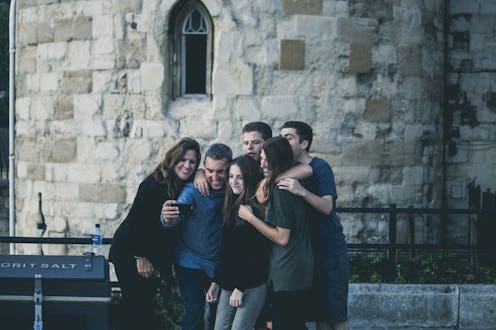Life
What To Ask Your Parents About Their Childhoods

Once upon a time, your parents were twentysomethings. They had crushes, they dated, they got stood up, they got cheated on, they screwed people over, they took sick days when they weren't sick, they got too drunk or too high and said things they couldn't take back. They obsessed over conversations and grew apart from good friends. They had ingrown hairs and sunburns and anxiety and difficulty paying attention in school. They got into fender-benders, they broke the rules, they lied to their parents, they ate themselves into a food coma, they listened to music so loud their ears rang. They lied to get out of trouble, they prayed for good fortune, they made up baby names and stole cash from their parents.
Sometimes it's hard for me to wrap my head around the concept that my parents were, are people, too. They weren't just flung from space, pregnant and mature and ready to govern a household. They didn't come pre-downloaded with answers to all the questions — they had to act out the answers themselves. My parents are not particularly young — I'm the youngest of three, and their age weighs heavily on me. How is it possible that all the time of your life isn't enough time to get to know someone?
Before I started asking my parents questions, I saw my German heritage as an answer to a question that sometimes came up on dates or explained my light hair. I didn't understand it as I do now — the result of my great grandfather escaping the Czar in Russia and setting up camp in Hamburg to raise his family and eventually partially contribute to my coloring. Before I started asking my parents questions, I thought I was the only one to struggle with math or get hives under stress or swoon for the smell of lavender. So much of our upbringing is coated with the positive reinforcement that we are indeed unique. But the truth of the matter is that we're not. We're a conglomeration of recycled genes and hardware — we're a mosaic of our ancestors — and our light is not new, but it's beautiful. These are 12 things you should ask your parents about their childhood, because you can't know yourself until you know what you're made of ... and because parents are people, too.
What Were My Great & Great Great Grandparents Like?
Downloading a family tree won't really introduce you to your heritage — not the way the anecdotes and memories your parents know will. Get the stories the websites won't tell you.
What Was Your Relationship Like With My Grandparents?
Maybe blissful or strained relationships run in the family. In order to understand the basis for your relationship with your parents, try to understand the kinds of parent-child relationships they grew up with.
What Life Did Your Parents Want For You?
The support of the family can make or break a person's path. Find out what obstacles they had to overcome to get what they want, and how they reconciled with what their parents wanted from them, if different.
How Have Your Values Changed?
People's beliefs tend to change over time. Experiences can sway them one way. Ask your parents about how they came to believe in the things they do — there are more than a few good stories in there.
What's The Worst Thing You've Ever Done?
They might not admit it or remember it, but it's an interesting experiment. And the concept of "worst" is entirely subjective, so you'll get to know about a lot more than just the surface question.
What Did You Struggle With In School?
That hatred for algebra probably has roots. It might feel very isolating to struggle with something in school, but you might not be alone. Ask your parents what was hard for them and talk to them about how they overcame it.
Were You Ever Plagued With Depression Or Anxiety?
Some things are genetic, others are not. Seek the root of your mental health within your parents.
What Did You Get In Trouble For Growing Up?
Maybe you both had the same naughty bones. Maybe your propensity for socializing in class or stealing candy from babies is hereditary.
Who Was The First Person To Break Your Heart?
This goes back to that whole "parents are people, too" concept. Just because they might be happily married or divorced now doesn't mean they didn't have some serious ups and downs with other people first.
What Did You And Your Best Friend Do For Fun?
Cow tipping? Manicures? Karate? You might be surprised to find what kinds of shenanigans your parents were capable of at your age.
How Did You Treat Yourself?
The kind of relationship you have with yourself might be a reflection of the kind of relationships your parents have with themselves. It's nurture and nature.
Was It Hard To Leave Your Youth?
Ask them about what it was like to decide to start a family. Get a feeling for the state of the world they were living in before you came into it. You'll probably find that a lot of the transitionary confusion that they had in their 20s or 30s is the exact same feeling that you're having right now, and it can help put it in perspective in an entirely new and relieving way.